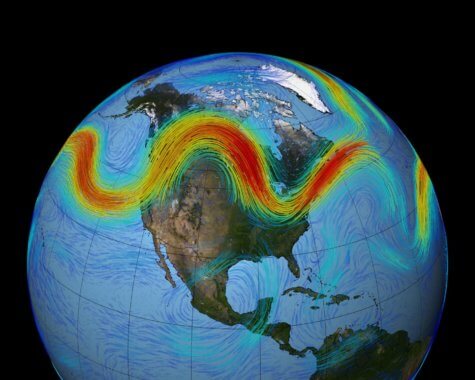By John Anderer
EXETER, England — The “wavy” behavior of Earth’s jet stream, or air currents, around the mid-latitudes over the past years isn’t being caused by rapid warming in the Arctic region. That’s the conclusion of a new study conducted at the University of Exeter that investigated the effect of increasing arctic temperatures on weather patterns in the United States and Europe.
Many recent pieces of research have concluded that warmer weather in the Arctic is causing unpredictable, extreme weather events in the U.S. and Europe in recent years. But this study didn’t find much evidence to support such a claim. In fact, instead of Arctic warming causing jet stream changes, the study’s authors say it more likely that “random” jet stream fluctuations are influencing odd weather in the Arctic.

“While there does appear to be a link between a wavier jet stream and Arctic warming in year-to-year and decade-to-decade variability, there has not been a long-term increase in waviness in response to the rapidly warming Arctic,” comments lead study author Dr. Russell Blackport, a Research Fellow in Mathematics, in a release.
Many scientists have been interested in whether or not the jet stream’s winding course through the Northern Hemisphere in recent years has been caused, or at least contributed to, by climate change. For the past two decades, the jet stream in the mid-latitudes has had a noticeably more “wavier” flow, and these changes in its patterns have just so happened to coincide with unusual warming in the Arctic.
This wavier jet stream flow has caused some extreme weather to hit the United States and Europe, bringing about intense cold air and very wintry weather.
To come to their conclusions, the study’s authors analyzed a number of climate model simulations, as well as recorded weather patterns going back 40 years. During this research, they discovered that while in past years the jet stream has tended to become more unpredictable in the autumn and winter, that pattern has actually reversed itself in more recent years. That observation doesn’t gel with the arctic theory because arctic warming has stayed consistent.
With this reversal in mind, researchers say that the jet stream really has no predictable long-term trends in terms of “waviness.” That notion is also supported by their climate models, which found little connections between the jet stream’s course and Arctic warming.
“The well-publicized idea that Arctic warming is leading to a wavier jet stream just does not hold up to scrutiny,” says Professor James Screen, an Associate Professor in Climate Science at Exeter. “With the benefit of ten more years of data and model experiments, we find no evidence of long-term changes in waviness despite on-going Arctic warming.”
The study is published in Science Advances.


